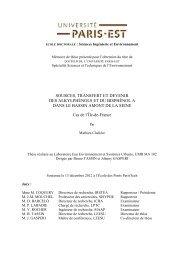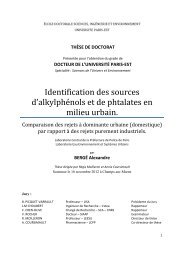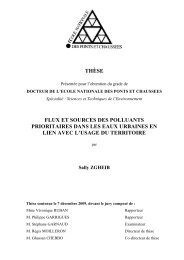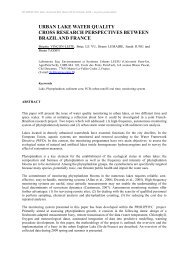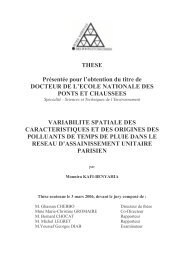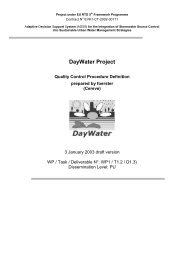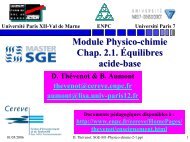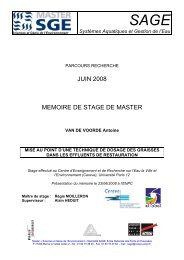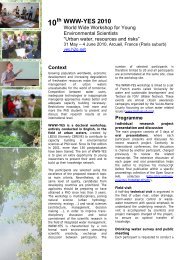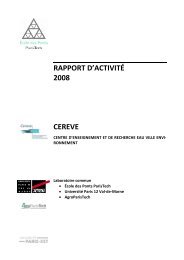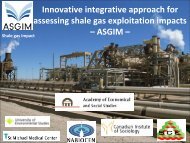View - ResearchGate
View - ResearchGate
View - ResearchGate
You also want an ePaper? Increase the reach of your titles
YUMPU automatically turns print PDFs into web optimized ePapers that Google loves.
8 Economic and environmental foresight as a toolfor integrated coastal zone managementM. Cordier*INTRODUCTION* Centre d’Etudes Economiques et Sociales de l’Environnement de l’Université Libre deBruxelles (CEESE-ULB), 44 avenue Jeanne, CP. 124, 1050 Bruxelles, Belgium.(E-mail: mcordier@ulb.ac.be) and C3ED de l’Université de Versailles-Saint-Quentin-en-Yvelines (UVSQ), UFR SSH, 47 Boulevard Vauban, 78047 Guyancourt Cedex, France.AbstractThe PhD “economic and environmental foresight as a tool for integrated coastal zonemanagement” started very recently in December 2007. It aims at building amethodological framework for economic analysis as a tool for integrated coastal zonemanagement processes. It relies on economic and environmental foresight methodologies.The later might be defined as a mean to analyze the scientific knowledge for the benefitof the society, with the aim to foreseen the various possible futures. The Seine estuarywill be used as study case and the following environmental issues will be studied in orderto illustrate the potential of our methodology : heavy metals, eutrophication and climatechanges. The first step will consist in a characterization of the study zone in economicand environmental terms. Regional economic accounting methodologies – NAMEA,green input-output tables – as well as the construction of sustainable developmentindicators will be the methodologies used to carry out this task. The second part of thework relates to modeling, i.e. parametrising as fine as possible relationships betweeneconomic components of the system and their impacts on the environment. The third stepis about foresight strictly speaking, which means simulating management scenarios. Eachscenario will be assessed in terms of environmental goals, implementation costs, relatedbenefits, and distribution of benefits and costs among stakeholders.KeywordsInput-output matrix; NAMEA; satellite accounts; green accounting; sustainabilityindicators; coastal zones, integrated management, ICZM, deliberation tool, scenarios, LeHavre, Seine watershed, France.The PhD started very recently in December 2007 and is going to end in December 2010. It issupported by C3ED-UVSQ, in partnership with CEESE - ULB, Département d’EconomieMaritime from IFREMER and Centre de Droit et d’Economie de la Mer from Université deBretagne Occidentale. Their aim is to develop economic evaluation tools for ecologicaleconomic foresight as a support to Seine estuary management.The choice of this PhD topic originates from the massive production of scientific knowledgefunded by the research program Seine-Aval in Northern France. However this knowledge suffersa lack of integration with local and regional economic issues. This is the reason why our workwill be highly transversal by gathering knowledge from various scientific disciplines andpromoting integrated coastal zone management (ICZM) by integrating modeling and scientificknowledge into governance processes.Problems of natural resources overexploitation and degradation, negative externalities leading toeconomic losses and social conflicts, and in fine, sustainability issues, partly originate from theintensification of human use of natural coastal resources. ICZM, as a governance process in theframework of sustainable development, aims at integrating in decisional processes all thestakeholders in order to plan and implement preservation and development measures of coastalsystems and resources.Scientists are needed in ICZM processes in order to bring their knowledge in environmental andeconomic evaluation as well as propositions for decision support. A multidisciplinary transversaland integrated approach, would allow answers to be found for complex questions relating tosocial and environmental issues. Indeed, each discipline alone would not be able to answer suchkind of issues. In that context, this PhD starts from ecological economic foresight with the aim tobuild a methodological framework for economic analysis in support to ICZM processes.Foresight might be defined as a mean to structure and analyze scientific knowledge in order tohelp society to foreseen different possible futures. It starts from present and past observationsand use modeling tools. To achieve that, relationships between human activities and theirenvironmental impacts will be schemed as a system. This system will be the basis for theanalysis of complex relations between land and resources uses, environmental dynamics andgovernance processes. One of the goals of foresight methods is to influence future dynamics ofsocio-ecological systems in order to drive them towards sustainable development schemes.The Seine estuary has been selected as study site because of the highinteractions between human and nature existing in its interface land/seathat has been highly modified from its initial morphology. Thisestuarine ecosystem is rich in terms of environmental functions(hydrodynamic and sediment control in the Seine watershed, highfaunal and floral biodiversity, specific fish habitats, etc.) and economicfunctions (tourist and marina activities, natural resources exploitation,industrial and harbor activities, etc.). The intensification of human usesdue to demographic increase in the Seine watershed, heavy polluting industry development,increase in agricultural pollution from intensive cropping and breeding and morphologicalmodifications resulting from harbor development in Rouen and Le Havre, are the main causes toenvironmental degradation of the studied area. The impacts of this list of human activities on theSeine estuary are eutrophication processes during summer, increases in chemical andmicrobiological contaminations, etc., and finally, quantitative and qualitative decreases in naturalareas as well as their ecological functions.The environmental issues to be studied are the followings: heavy metals will be the main issuesselected to illustrate the potential of our methodology. Climate changes will be an additionalissue to be quantified, and eutrophication will be considered first in a qualitative way, andsecondly in a quantitative way if time constrains allows it. Contacts should be done withscientists from Sisyphe at the Paris-Jussieu university who have written on those three topics(Thévenot, Meybeck, Garnier, Billen, Ducharne, etc.). 4747 Meybeck et al. (2007), Thévenot et al., (2007), Ducharne et al. (2007), Garnier et al. (2007),Billen et al. (2007), etc.WWW-YES 2008, Paris 13 – 16 May 2008 67WWW-YES 2008, Paris 13 – 16 May 2008 68


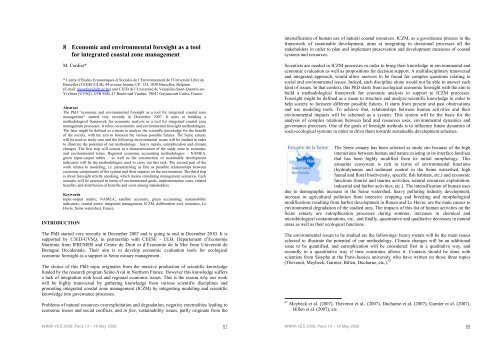
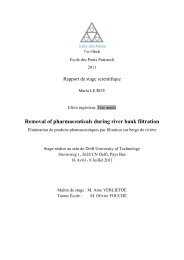
![[pastel-00730831, v1] Incidence des pratiques d'entretien ... - LEESU](https://img.yumpu.com/50938896/1/184x260/pastel-00730831-v1-incidence-des-pratiques-dentretien-leesu.jpg?quality=85)
